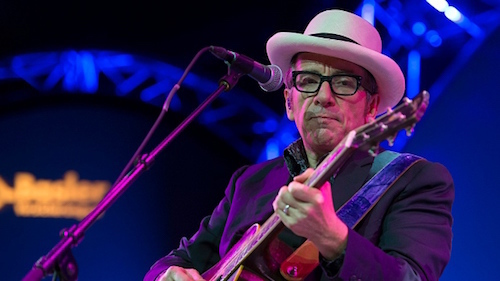
11.22.2016
ELVIS COSTELLO REMEMBERS HIS FATHER’S INFLUENCE IN NEW MEMOIR
CBC News: November 19th 2016
Famous musician’s father performed in jazz dance band, planting the seeds of Costello’s career
When Declan Patrick MacManus was just seven years old, his father — a musician of Irish descent — left home. But he remained a big inspiration to the young boy, and the two would go on to share a lifetime of music together.
That young boy is better known as Elvis Costello
Costello’s new memoir, Unfaithful Music & Disappearing Ink, sees him grapple with his relationship with his father, who started out as a singer for a popular jazz dance band.
The book weighs in at a hefty 674 pages and spans Costello’s career and travels, with the some of the world’s best musicians making casual entrances and exits thoughout.
Costello, who is also known to British Columbians as the husband of Nanaimo-born jazz singer and pianist Diana Krall, joined host Stephen Quinn on CBC’s On the Coast.
Stephen Quinn: I would like to begin where the book begins, and that’s with your father, Ross MacManus. How big an influence was your father musically?
Elvis Costello: My mother and my father met over the counter at a record shop — my mother sold records from the age of 13, she was the gal in town that knew about jazz when my dad wanted to be a bee-bop trumpet player.
I obviously came along a little later, and my dad had to make what I imagine was a slightly painful decision initially to move from the music that he loved, but really wasn’t rewarding financially, to something which he discovered he had a talent for, which was entertaining people singing popular songs of the day.
Our house was filled with both the music my parents listened to for pleasure, and the work tools of my dad’s job as a dance band singer, which were the demonstration records and sheet music that he used to learn whatever the releases were that week.
Was it strange at all, what your father did for a living, when you looked around at your peers?
I think that my friends’ parents and even some of my teachers at school thought that it was inherently frivolous, and even a few of them didn’t believe it was really a job.
Of course, on the other side of it, when he popped up on the radio, it would be noted, and of course then he was on the Royal Variety Show of 1963 alongside the Beatles and a number of jugglers and illusionists and comedians. That kind of stuff would be noted.
But the fact that my dad would go to work while other people’s parents would return from work — I think it probably seemed like we were close to disreputable, but likable.
Was the seed planted then that you could sing for a living?
I was asked to come out of class and sing. I developed too loud a voice in the choir. But after a while, like most kids, you become self-conscious about doing that, and definitely in my early teenage years, I was adamant that I wasn’t going to follow in the family business.
I thought it was much more likely I was going to end up in some sort of retail job because my education didn’t lead me anywhere professional. I was absolutely adamant that although I loved music, I wasn’t going to become any kind of performing musician.
And then I thought, if I was going to be involved in music in any way — I better find a way to make it pay my rent.
Stephen Quinn will be speaking with Elvis Costello onstage at the Chan Centre on November 23
This interview has been edited and condensed. To listen to the full interview, click here.